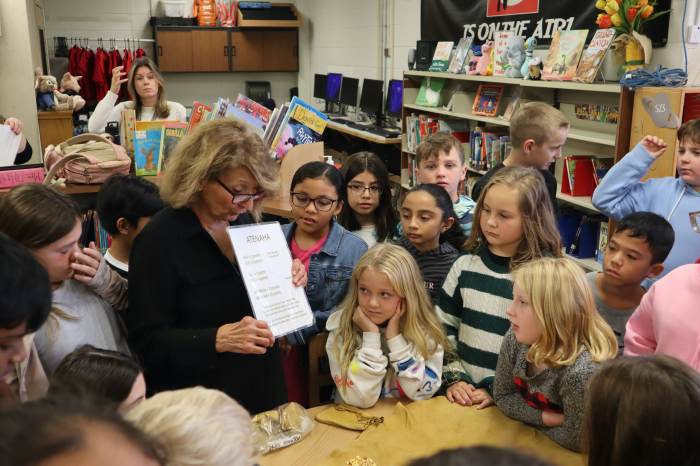Town hall format and Obama’s performance finds president rebounding in the polls
On Tuesday, Oct. 16, Hofstra University was the site for the second of three debates between President Barack Obama and Governor Mitt Romney. Hofstra had also hosted a debate between then-Democratic nominee Obama and GOP nominee Sen. John McCain back in 2008, making the school just the second university to host consecutive presidential debates. (St. Louis’ Washington University was the other.)
With Romney scoring what many considered an upset victory over Obama’s decidedly lackluster performance in the first debate, this follow-up was going to be a “deal maker or breaker in this campaign,” according to political pundit Chris Matthews, who spoke at Hofstra the prior week. Shortly after moderator Candy Crowley took the stage at 9 p.m., it was clear both candidates were prepared to come out swinging, making for a lively hour and a half that found roughly 65 million viewers tuning in to the town hall-style debate, according to the Nielsen Ratings.
Drill, Baby, Drill
High prices at the pump were a hot button issue as evidenced by Phillip Tricola asking President Obama’s stance about Energy Secretary Steve Chu having been quoted three separate times saying that helping to lower gas prices was not the job of the Energy Department. Obama responded that energy independence was the key and that his administration had made inroads toward having that goal by increasing oil, coal and natural gas production, doubling fuel efficiency standards on cars and doubling clean energy production—wind, solar and biofuels. He also accused Governor Romney of planning to allow oil companies to write energy policy should he be elected.
Romney said the president’s response was more rhetoric than reality, based on the governor’s belief that oil production and gas production were down on federal lands, 14 and 9 percent respectively. He insisted that drilling licenses and permits for drilling on government-owned lands and waters had been halved and that over-regulation was also a significant barrier.
“What we don’t need is to have the president keeping us from taking advantage of oil, coal and gas,” Romney pointed out. “I was in coal country. People grabbed my arms and said, ‘Please save my job.’ When the president ran for office, he said if you build a coal plant, you can go ahead, but you’ll go bankrupt. That’s not the right course for America.”
The governor also expressed befuddlement over the president’s refusal to sign off on the Keystone XL pipeline, a massive 1,179-mile project that would stretch from Hardisty, Alberta to Steele City, NE. He also took issue with the president’s assertion that drilling had increased in federally owned areas.
“In the last four years, you cut permits and licenses on federal land and federal waters in half,” Romney said and then hammered Obama about the exact percentage of licenses and permits that were cut. As the governor continued saying drilling was down, the president insisted that statement was untrue.
“Here’s what happened. You had a whole bunch of oil companies who had leases on public lands that they weren’t using,” the president explained. So what we said was you can’t just sit on this for 10,20, 30 years, decide when you want to drill, when you want to produce, when it’s most profitable for you. These are public lands. So if you want to drill on public lands, you use it or you lose it.”
Between this exchange and the president’s accusations of Romney dismissing jobs born through wind power development and the governor claiming that the president misrepresented himself as pro coal, gas and coal, this was one of the more contentious exchanges of the night.
An Act Of Terror Or Not? Candidates Debate Libya Attacks
Long Island shined in the weeks leading up to and during the Hofstra debate. However, in the waning minutes of the rock em’ sock em’ rhetoric tussle, a question surfaced and its origination could be traced to a village in Nassau County: Mineola.
Kerry Ladka, an undecided voter of Global Telecom Supply on Windsor Court, posed a question inquiring about reports that stated the State Department “refused extra security for our embassy in Benghazi, Libya prior to an attack that killed four Americans.” Secretary of State Hillary Clinton had taken full responsibility for the attacks a few days before the debate.
President Obama stated he was totally responsible. The attack marked the first time an American ambassador was killed in an assault overseas since 1979.
“I’m the president and I’m always responsible, and that’s why nobody’s more interested in finding out exactly what happened than I do,” Obama exclaimed.
The president said when he found out the Benghazi consulate was being overrun he got on the phone with his national security team and gave three instructions. He said to beef up security procedures in every embassy in the region, investigate what happened and find out who did it and hunt them down because “one of the things that I’ve said throughout my presidency is when folks mess with Americans, we go after them.”
Obama tried to squash Romney’s accusations that the administration tried to cover it up for political gain. The Republican candidate claimed it took Obama two weeks to deem the violence an act of terror.
“You said in the Rose Garden, the day after the attack, it was an act of terror?” Romney asked. “It was not a spontaneous demonstration, is that what you’re saying? I want to make sure that we get that on record because it took the president 14 days before he called the attack in Benghazi an act of terror,”
Crowley interjected, saying that in a Rose Garden press conference, Obama did call it a terror attack one day after the Americans were killed. She told Romney a few seconds later that he was correct that it took the White House two weeks to fully acknowledge it as an act of terror, even though the president previously used the wordage.
It’s The Economy Stupid
With the Labor Department reporting that September’s unemployment numbers went down from 8.1 to 7.8 percent, the economy continued to be the hot button issue that it’s been throughout this campaign and all of Obama’s presidential term since he became the Democratic nominee back in 2008.

When Michael Jones asked, “Mr. President, I voted for you in 2008. What have you done or accomplished to earn my vote in 2012? I’m not that optimistic as I was in 2012. Most things I need for everyday living are very expensive,” Obama admitted that the past four years have been tough. But he also pointed out that he came through with the tax cuts he promised for the middle class and small business, passed Wall Street reforms that have created five million jobs and saved the auto industry while he was at it. The president also agreed that Americans are still struggling, but said if he’s re-elected to a second term, he has plans for manufacturing and education, and would use savings from ending wars to rebuild the country and put people back to work. He added that the difference between commitments he’s kept and planned to keep differ from Romney’s, which Obama said were signing a no tax pledge so that the wealthy wouldn’t be leaned on to reduce the deficit in addition to cutting Planned Parenthood funding and repealing Obamacare.
For Romney’s part, he was equally direct in pointing out that Obama’s promise to bring unemployment down to 5.4 percent was never fulfilled and the difference between the current numbers and that one is nine million Americans without work. Further, the governor also said that with the median family income down $4,300 and 23 million Americans out of work, the president’s record reflects an inability to cut the deficit and put in Medicare and Social Security reforms to preserve them.
Fair and balanced trade was also part of the economic recovery equation both candidates touched on. With criticism of Romney’s role in the exporting of jobs that private equity firm Bain Capital engaged in during his time there, it was inevitable that someone like Carol Goldberg would ask, “The outsourcing of American jobs overseas has taken a toll on our economy? What plans do you have to put back and keep jobs here in the United States?”
In pointing out that half a million manufacturing jobs have gone overseas in the past four years, the governor blamed China for being a currency manipulator, as well as excessive regulations enacted by the president and high corporate taxes.
The president agreed that corporate tax reform was needed, but he said that closing loopholes that enabled corporations to deduct expenses when they moved to China not only allowed that to have offshore tax advantages, but was also unfair to small businesses and big business start-ups whose output is domestic and subject to higher taxation. Obama did use the word outsourcing in relation to Romney’s time in the private sector and also countered that China’s currency has actually gone up 11 percent in the time he’s been president. He added that U.S. exports had significantly increased as well.
China continued to be the villain as Romney accused it of not operating on a level playing field, of stealing intellectual property and of engaging in cyber-theft, citing the existence of an unauthorized Apple store in China selling counterfeit goods.
Obama said a major part of economic recovery was ensuring that China plays by the rules and making trade deals that wind up giving American workers and businesses a fair shake. Toward the end of the evening, he reiterated his belief that the only way for the economy to grow was for everyone to have a fair shot, do their fair share and play by the same rules. He also said that was the key to America building its middle class in the past.
Romney said his goal was to get the country back on track. He also added that voters shouldn’t have to settle for high gas prices, chronically high unemployment numbers, 47 million people on food stamps and half of all kids coming out of college not able to get work, joining the other 23 million people struggling to find good jobs.
Tax Cuts For The Middle Class: When Are They Coming?
With the country still in a recession, tax relief, specifically for the middle class, continued to be a forefront issue leading up to the Hofstra debate. Both the president and Romney have initiated plans they believe will save middle class Americans in tax cuts, while making citizens on the high end of income, pay more.
Obama took aim at Romney’s tax plan, stating, “Governor Romney doesn’t have a five-point plan,” he said. “He has a one-point plan. And that plan is to make sure that folks at the top play by a different set of rules…You can ship jobs overseas and get tax breaks for it. You can invest in a company, bankrupt it, lay off the workers, strip away their pensions, and you still make money. That’s exactly the philosophy that we’ve seen in place for the last decade. That’s what’s been squeezing middle-class families.”
Romney insisted he wants to bring tax rates down and “simplify the tax code, and I want to get middle-income taxpayers to have lower taxes…I want middle-income taxpayers to have lower taxes because middle‐income taxpayers have been buried over the past four years.”
Romney said the top 5 percent of taxpayers will continue to pay 60 percent of the income tax the nation collects, but Obama stated his Republican challenger wants to continue the Bush tax cuts for wealthy Americans, which gives individuals earning more than $200,000 and families above $250,000 a cut. Tax rates could rise for all Americans on Jan. 1, 2013 if a deal is not reached, according to ABC News.
Democrats and Republicans agree that rates for middle-income Americans should remain the same although they differ on those above the $200,000 per individual and $250,000 per family level. Romney said Obama’s desired tax hike on upper-income earners is his only concrete plan for a second term.
Illegal Immigration: Solutions Needed
Resolving the issue of undocumented illegal immigrants in the United States will be of prime importance, regardless of who wakes up on Nov. 7 as the next president. President Obama stated his achievements in the immigration area, including accelerating legal procedures for visas, border security and deporting immigrants with criminal records.
“We should [stop illegal immigration] smartly and go after folks who are criminals, gang bangers, people who are hurting communities, not after students, not after folks who are here just because they’re trying to figure out how to feed their families,” he said. “And that’s what we’ve done.”
Romney noted his plan for broadening the system of visas for foreigners with university diplomas in science and mathematics, halting illegal immigration because there are already 4 million people waiting for a visa and zero amnesty offerings for the reportedly 11 million undocumented immigrants in the United States.
“We’re going to have to stop illegal immigration,” Romney said. There are 4 million people who are waiting in line to get here legally. Those who’ve come here illegally take their place. So I will not grant amnesty to those who have come here illegally.”
With regard to undocumented students, Romney said that he supports legalizing their status by having them serve in the military and he repeated that Obama did not fulfill his 2008 campaign promise to present an immigration reform package.
Obama alleged that Romney said the stop and frisk law in Arizona should be a model for the nation, with the Republican arguing “I did not say that the Arizona law was a model for the nation in that aspect. I said that the E-Verify portion of the Arizona law, which is the portion of the law which says that employers could be able to determine whether someone is here illegally or not illegally, that that was a model for the nation.”
Breaking Through The Glass Ceiling With Lilly Ledbetter
Throughout this campaign, the Democrats have repeatedly branded the Republicans as engaging in a war on women based on the GOP’s stands on reproductive rights, equal pay for women and the defunding of Planned Parenthood. It was the latter issue that was the basis for Floral Park resident Katherine Fenton’s question, to President Obama: “In what new ways do you intend to rectify the inequalities in the workplace, specifically regarding females making only 72 percent of what their male counterparts earn?”
Obama immediately responded with a personal anecdote, citing the fact that he was raised by a single mom with two kids who ascended from secretary to vice-president of a local bank before hitting a glass ceiling. Not surprisingly, the president brought up the Lilly Ledbetter Fair Pay Act of 2009, which also was the first bill signed into law by the president.
Based on a lawsuit filed by a production supervisor at a Goodyear tire plant claiming pay discrimination under Title VII of the Civil Rights Act of 1964, the Lilly Ledbetter Act was initially opposed by the Supreme Court when the case was tried before it in 2007. The court’s majority ruled that a statute of limitations applied in this situation because any alleged discriminatory decisions were made 180 days prior to the filing of the complaint. Justice Ruth Bader Ginsburg’s minority position stated that a complaint shouldn’t be time-barred and should be able to be filed from any time in which a paycheck with a discriminatory amount is issued. In voicing his support of the Lilly Ledbetter Act, Obama trumpeted his advocacy for equal pay and said, “This is not just a woman’s issue, this is a family issue, this is a middle-class issue…”
The president also held up his expansion of U.S. Pell grants, which he explained was made possible by taking $60 billion going to banks and lenders acting as middle men in the student loan program and instead giving it directly to students.
Governor Romney agreed that women in the workplace are an important topic that he learned about while running Massachusetts. In noticing that men seemed to be the only ones applying for cabinet positions, Romney claimed to make a concerted effort to find qualified women, reaching out to women’s groups, who brought him “whole binders full of women.” He pointed out that after his cabinet was staffed, SUNY Albany concluded in a survey of 50 states, that Massachusetts had more women in senior leadership positions than any other state. And while the governor added that the new improved economy he was going to bring into play would help women and that he would support them in the workforce, he did not provide any details about how he would do that.
And while Romney clung to pointing out there was a 7.8 percent unemployment rate and 23 million people looking for jobs, President Obama responded by pointing out Romney once declaring that he would eliminate funding for Planned Parenthood.
“When Governor Romney says that we should eliminate funding for Planned Parenthood…That’s a pocketbook issue for women and families all across the country,” the president said. “And it makes a difference in terms of how well and effectively women are able to work.”
As for the economic woes women face today, Obama insisted the key to financial growth was “when everybody participates and women are getting the same fair deal as men.”
Locked And Loaded On The Second Amendment
When Nina Gonzalez asked, “President Obama, during the Democratic National Convention in 2008, you stated that you wanted to keep AK-47s out of the hands of criminals. What has your administration done or plan to do to limit the availability of assault weapons?” it was clear that both candidates were going to handle Second Amendment issues with kid gloves.
While quickly pointing out America’s long tradition of hunting, sportsmen and people looking to protect themselves, the president explained that while background checks have gotten better, enforcement of gun control laws needed to be strengthened. Obama stated that part of the solution was the reintroduction of an assault weapons ban. He also shared an anecdote about the miraculous survival of a young man who had been shot in the head during the movie theater massacre in Aurora, Colorado.
Romney made it clear that he was not in favor of new pieces of legislation “on guns and taking guns away or making certain guns illegal,” pointing out that automatic weapons were already designated unlawful. The solution, he said, was more two-parent families and better schools. The governor also claimed that the president’s biggest failure in this arena was Operation Fast and Furious, a sting operation in which the ATF allowed licensed gun dealers to sell huge quantities to gunrunners in the hopes that they could be traced back to Mexican drug cartel leaders.
By the time the operation ended in January 2011, only 665 of the original 2,020 weapons were accounted for, with the rest presumably on the street. A subsequent investigation conducted by Rep. Darrell Issa and Sen. Chuck Grassley has dogged both Obama and Attorney General Eric Holder. The governor also expressed his disbelief that a gunrunning operation of this magnitude could be conducted, in light of the aftermath.
When moderator Candy Crowley asked why Romney changed sides on an assault weapons ban, considering that he had signed one in Massachusetts, he credited pro-gun and anti-gun people coming together to craft that piece of legislation. While the president accused the governor of switching sides to curry favor with the NRA, he also went on at length about providing opportunities for young people to succeed.
In the immediate aftermath of the debate, whether it was at Spin Alley or on social or traditional media, liberals declared victory while conservatives asserted the debate was a tie. According to a CNN/ORC International nationwide poll conducted right after the second debate, 46 percent of voters said the president won while 39 percent polled gave the victory to Republican nominee Mitt Romney. And while the third and final debate slated for Monday, Oct. 22 in Boca Raton, FL on the horizon, Hofstra University was briefly the epicenter of the political world, at least for one night.
Hofstra University Debate 2012 By The Numbers
14.5: Miles of electric cable
16: Generators totaling 8.460 kilowatts (enough electricity to power 320 residential homes)
35: Special academic courses
50+: Related lectures and programs
100: Televisions
137: Wi-Fi access points
350: Student volunteers
750: Approximate amount of international visitors (including media)
1,300: Phones & Debate 2012 signs
2,500: Local K-12 students visiting for debate-related programs
5,000: Gift bags & commemorative T-shirts
6,576: Students that entered the lottery for a debate seat
7,000: The estimated amount of students that registered to vote in the weeks before Hofstra University hosted the third and final presidential debate on October 15, 2008
10,000: Commemorative pins
200,000: Feet of data/voice/television cabling




























